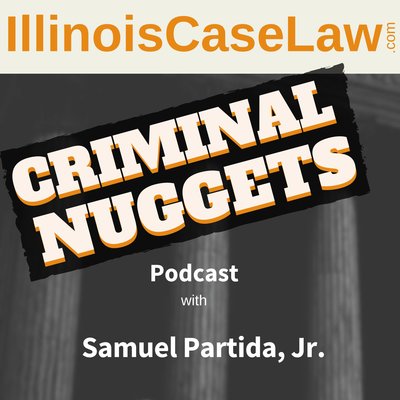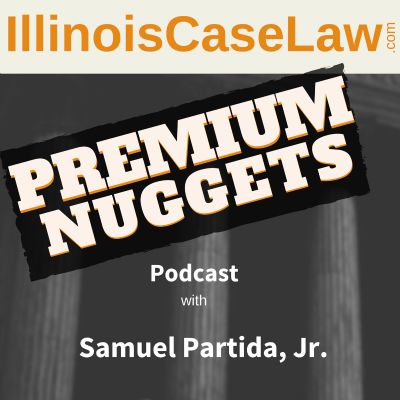Aug 24, 2014
Ineffective assistance of counsel from cross examination results
after defense attorney asks one little question. This was a classic
example of asking one too many questions. Should have sat down
before damage was done.
http://illinoiscaselaw.com/ineffective-as…ss-examination
This podcast episode describes what happened in People v. Dupree, 2014 IL App (1st) 111872.
The question that did the damage was likely one of those "after thought" questions. The kind that are not scripted and come out of your mouth on your way to sit down.
Facts
This was a drive by shooting with three people in the car. Two people in the car turned state's evidence and were testifying against Defendant who they say was the shooter.
There was no other physical evidence in the case. The independent witness where inconsistent. Thus, the appellate judges thought the testimony of the "flippers" was crucial to the conviction in the case.
Also, the appellate court pointed out that the motive for the shooting laid with the flippers and not so much with Defendant.
The Statements
For the sake of understanding, it is easier to boil down the case down to two different statements by one of the flippers. These were statements made to the police during interrogations.
We will call the first statement, "Statement A." This was a complete denial of any involvement in the shooting. It was probably one of those,"I don't know what you talking about, man" kind of statements.
Lets call the second statement, "Statement B." This statement was about a month later. Here, the statement is an acknowledgment of involvement with the small detail that Defendant was the shooter. At Defendant's trial the flipper repeats Statement B for the jury.
Just to be clear, I mean that the flipper testified at trial consistent with Statement B. That is normally how it would work. Ordinarily, the prosecutor would not be allowed to admit the actual statement the witness made to police or even acknowledge that there was a statement. The prosecution would not ask the witness, "Didn't you tell the police that the Defendant was the shooter." The prosecutor would just ask, "What happened in the car?"
The Cross Examination
Of course, defense counsel has to go after the witness for the inconsistent statements to the police. Statement A is different from Statement B. This is the kind of impeachment of the witness we would expect and jump on at trial.
But before counsel sits down...
Ineffective Assistance of Counsel From Cross Examination
He asks that one little question that the appellate court jumped on to reverse and make a finding of ineffective assistance of counsel from cross examination.
The exact quote is not in the decision. But it was something along the lines of:
“Did your 'enhanced memory' just come to you last week?”
That was all it took! Sounds innocent doesn't it? The appellate court said it was anything but.
This one little question opened up a door that was big enough for a Mac truck to plough through carrying nothing but a load of trial error.
That one question allowed the State to introduce Statement B to the jury. They then did it multiple times. They argued it substantively. No limiting instruction was given.
The Law
The evidentiary rule of evidence that is at play here is the Prior Consistent Statement under Federal Rule 801(d)(1)(B). Illinois has no comparable companion provision in its Rules of Evidence.
However, you can find a comment about a prior consistent statement within the Illinois Rules that says:
Note that FRE 801(d)(1)(B), which makes prior consistent statements of witnesses substantively admissible when "offered to rebut an express or implied charge against the declarant of recent fabrication or improper influence or motive," has not been adopted. That is so because, as stated supra, Illinois allows such statements to be admitted, but only for rebuttal or rehabilitate purposes,not substantively.
See The Illinois Rules of Evidence, A Color-Coded Guide Containing the Codified Rules...page 117.
Thus, the rule in Illinois can be stated like this:
"A prior consistent statement may not be used on direct examination to enhance the credibility of a witness’s testimony, except to rebut an allegation of recent fabrication.”
The court said that prior consistent statements are so bad because they are likely to unfairly enhance the witness's credibility with the trier of fact simply because the statement has been repeated.
“The danger in prior consistent statements is that a jury is likely to attach disproportionate significance to them. People tend to believe that which is repeated most often, regardless of its intrinsic merit, and repetition lends credibility to testimony that it might not otherwise deserve.” See People v. Dupree, ¶ 52.
The Results: Recent v. Not Recent Fabrication
Look, it is an adversarial system. The prosecution is always lurking around trying to find something to pounce on. They can't be faulted for that.
Unfortunately, they had an opportunity and they may have exploited it a bit too much. The appellate court had a close case and they hung their hat on this most subtle of errors.
Subtle indeed. Defense counsel's argument was still that the witness was testifying on fabricated evidence. The problem was that he inferred that the fabrication was only recently created. His argument all along was that the fabrication indeed was there but that it started loner ago. That was the difference in the case.



